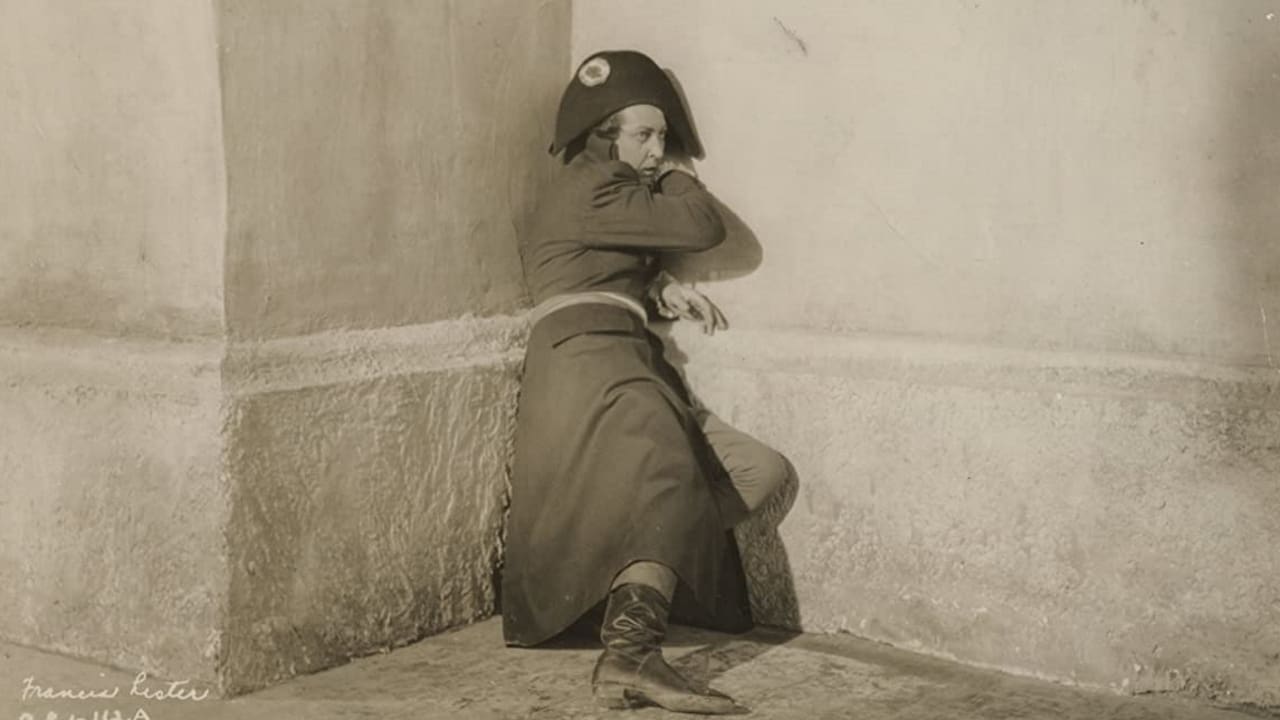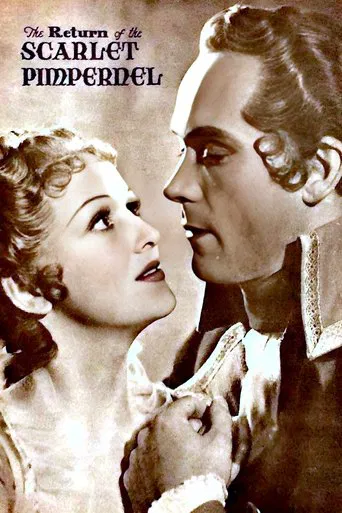

This is a sequel which instead sets its own terms. Lacking a star name, it is not a vehicle for a star to lift and be given entertaining scenes (and mask weaknesses), instead it is a very well crafted artistic production. Completely unremarked is the quality of the cinematography there is a still photographer's eye at work not to mention the sets and the handling of action. Instead of a star and their schtick which a production is obliged to both labour and indulge, there is point and purpose throughout in the screenplay which reflects the mixture of brutality, passion, paranoia, scheming and insecurity of the times. The pimpernel is more subtly acted than the sign-posted performance of a big star. His ruses, being the centre piece of the character, have to be and are more impressive including the disguises than in the case of a star who probably wishes to be recognisable at all times. Lacking any stars, it must rely on pure merit - and succeeds. It is after all a Korda production so would one expect less?
... View MoreBarry Barnes plays the title part in this sumptuous Alexander Korda film. In addition, a very young James Mason has a small role.This film picks up at the end of "The Scarlet Pimpernel". The Pimpernel's enemy, Chauvilland, has just been tricked into allowing him and his men to escape. However, Chauvilland now knows that Percival Blakeney is the Scarlet Pimpernel and he'll stop at nothing to lure him from England to France in order to arrest and execute him. Urging him on is the insane Robespierre—who threatens to have Chauvilland guillotined if Blakeney is not captured.There are no huge surprises in the film—once again, Blakeney is a master of disguises and once again he and his colleagues are always just a step away from the guillotine. The only surprise comes to those who know history, as this otherwise excellent film takes HUGE liberties with the real downfall of Robespierre—and in this case, the real historical account is far more exciting. Robespierre was himself accused of treason and sentenced to death—but he tried killing himself to deprive the audience of seeing his head removed. However, in the process, he shot off part of his face and was executed anyway! In addition to the ending being historically inaccurate, it was also pretty tough to believe no, impossible! Up until then, it was a solid and exciting film. This botched ending brings the rating down to 7—meaning it's still well worth watching but could have stood improvement.
... View MoreThis is the second version of the much-filmed adventure classic with the immortal hero named Scarlet Pimpinel ( Barry Barnes), and again the English aristocrat engaged in the underground effort to snatch out from under the blade of the guillotine Frenchmen caught in the Reign of Terror ( 1794 ) . This time Robespierre assigns the mission to track down Pimpinel in England . As Spanish Teresa Cabarrus , Tellien's lover , and Chauvelin (Francis Lister ) travel towards Brighton where abduct his wife ( Sophie Stewart ). Pimpinel returns to Paris and then Sir Percy hides his activities under various guises . His ruse may throw off the French authorities but the elusive pimpernel is also attempting to free his wife , though he is suddenly caught by Chauvelin.Barnes does a dashing hero leading several characters and posing as an officer , pauper or revolutionary . This lavish production results to be a good sequel with spectacular production design , impressive sets and nice scenarios . Less than stellar cast plenty of unknown actors with exception a young James Mason as Tallien. The motion picture is professionally directed by Hans Swartz , a Hungarian filmmaker in his last movie .In the film appears historical characters as Tallien , Theresa Cabarrus (Margarett Scott ) and is developed an intrigue about downfall's Robespierre ( Henry Oscar ). The actual events are the followings : Robespierre appeared at the Convention and delivered a two-hour-long speech. He defended himself against charges of dictatorship and tyranny, and then proceeded to warn of a conspiracy against the Republic. Robespierre implied that members of the Convention were a part of this conspiracy, though when pressed he refused to provide any names. The speech however alarmed members particularly given Fouché's warnings. These members who felt that Robespierre was alluding to them tried to prevent the speech from being printed . The next day, Saint-Just began to give a speech in support of Robespierre. However, those who saw him working on his speech the night before expected accusations to arise from it. He only had time to give a small part of his speech before Jean-Lambert Tallien ( James Mason ) interrupted him . Robespierre then attempted to secure the tribune to speak but his voice was shouted down. Robespierre soon found himself at a loss for words after one deputy called for his arrest . The Convention ordered the arrest of Robespierre, his brother Augustin, Couthon, Saint-Just, François Hanriot and Le Bas. Troops from the Commune arrived to free the prisoners and then marched against the Convention itself. The Convention responded by ordering troops of its own under Barras to be called out. When the Commune's troops heard the news of this, order began to break down, and Hanriot ordered his remaining troops to withdraw to the Hôtel de Ville, where Robespierre and his supporters also gathered. The Convention declared them to be outlaws, meaning that upon verification the fugitives could be executed within twenty-four hours without a trial. As the night went on, the forces of the Commune deserted the Hôtel of Ville and, at around two in the morning, those of the Convention under the command of Barras arrived there . Robespierre tried to kill himself with a pistol but only managed to shatter his jaw.For the remainder of the night, Robespierre was moved to a table in the room of the Committee of Public Safety where he awaited execution. He lay on the table bleeding abundantly until a doctor was brought in to fix up his jaw. The next day, 28 July 1794, Robespierre was guillotined without trial in the Place of the Révolution. His brother Augustin, Couthon, Saint-Just, Hanriot and twelve other followers . Only Robespierre was guillotined face-up.Other versions about this classic novel by Baroness Orczy are the following : First and the best in 1939 by Harold Young with Leslie Howard and Leslie Caron ; The Elusive Pimpernel , 1950, by Michael Powell and Emeric Pressburger with David Niven and Margaret Leighton and made for TV in 1982 by Clive Donner with Anthony Edwards and Jane Seymour and in 1999 with Richard E Grant and Elizabeth McGovern .
... View MoreWhile I think the original, 1934 version is much better with better actors, I really enjoyed seeing this movie. The actor who plays Sir Andrew in the first one comes back and had a larger part and in my opinion Sir Andrew is allowed to shine in this one. Marguerite is just played differently, she is kidnapped and perhaps a bit over dramatic, but so was the one in the book on occasion. She is also a perhaps more innocent version than was played by Merle Oberon and later Jane Seymour. Chauvelin doesn't have the air of evil that Raymond Massey is able to portray, you almost feel sorry for him in fact, rather than thinking him a evil villain. Overall, I believe it is worth seeing and I liked it. You have the chance to meet some of the other League members, which is an improvement over the original where Dewhurst is seen and not heard or credited and the others, except Andrew and maybe Hastings, are virtually non existent.
... View More